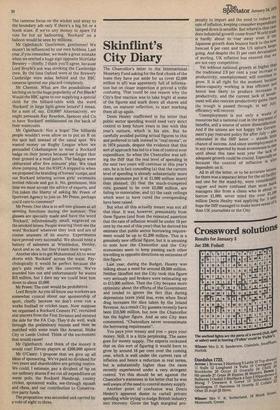Skinflint's City Diary
The Chancellor's letter to the International Monetary Fund asking for the first chunk of the loans they have put aside for us (over £2,000 million in all) was apparently full of information but on closer inspection it proved a trifle confusing. That could be one reason why the City's first reaction was to take fright at some of the figures and mark down all shares and then, on maturer reflection, to start marking them all up again.
Denis Healey reaffirmed in his letter that public sector spending would need very strict control to keep future years in line with this year's outturn, which is his aim. But he carefully avoided putting actual figures to this and preferred to talk instead in "real terms", or in 1974 .pounds, despite the evidence that this sort of approach has led to a loss of control over expenditure. So when the Chancellor was telling the IMF that the real level of spending in the next two years will continue at this year's rate, he is in fact conceding (a) that the current level of spending is already substantially more (some estimates put it at £1,000 million more) than planned; (b) that the much-trumpeted cuts, guessed to be over £3,000 million, are failing to materialise; and (c) the cash ceilings which were to have cured the overspending have been raised.
But what all this actually meant was not all that clear. It was, however, presumably from these figures (and from the repeated assertion that the rate of inflation would be under 10 per cent by the end of this year) that he derived his estimate that public sector borrowing requirement would be up to £1,200 million. This is a genuinely new official figure, but it is amusing to note how the Chancellor and the City economists seem to keep passing each other travelling in opposite directions on estimates of this figure.
List -year, during the Budget, Healey was talking about a need for around £9,000 million. Neither Skinflint not the City took this figure very seriously and brokers were estimating up to £13,000 million. Then the City became more optimistic about the efforts of the Government and tended to ignore the fact that during depressions taxes yield less, even when fiscal drag increases the slice taken by the Inland Revenue. As a result City guesses recently have been £10,500 million, but now the Chancellor has the higher figure. And as one City man commented, "Chancellors never overestimate the borrowing requirement".
You pays your money and you — pays your money. Still, it is a little perplexing. The same goes for money supply. The experts reckoned that on this sort of figuring it would have to grow by around 16 per cent over the coming year, which is well under the current rate of inflation and hence a reduction in real terms, but is substantially higher than the rates recently experienced under a very stringent control. Yet this should be set against the Chancellor's statement in his letter that he was well aware of the need to control money supply.
Another point of confusion was Denis Healey's apparent desire to curtail private spending while trying to nudge British industry into recovery. Given the high marginal pro pensity to import and the need to reduce the rate of inflation, keeping consumer expenditure tamped down is sensible. But where in that case does industrial growth come from? World trade is hardly about to roar away even if the Japanese growth does bounce back to the now forecast 6 per cent and the US upturn keePs going. And despite the 31 per cent devaluation of sterling, UK inflation has ensured that we are not very competitive.
Yet without national growth at higher than. the traditional 2.9 per cent a year increase in productivity, unemployment will continue t° grow. It is all right for the moment because, below-capacity working is less efficient ail.° hence less likely to produce increases in productivity, and the current lack of investment will also restrain productivity gains. Once the trough is passed through, in say
efficiency will recover. '
Unemployment• is not only a waste of, resources but a national cost in the payment nr benefits, and a source of union dissatisfaction. And if the unions are not happy the Government's pay restraint policy for after July — 8,15° reiterated in the IMF letter — stands little chance of success. And since unemployment! in any case expected by most economists to Ill until about this time next year the lack ° adequate growth could be crucial. Especially s° because the control of inflation is als° dependent on it. All in all the letter, or to be accurate lett,e.ts. for there was a separate letter for the oil facility and one for the stand-by, were considerahlr, vaguer and more confused than most ban managers like from a client who is about too borrow £1,000, never mind the over flf113,,, million Denis Healey was applying for. onl.". hope the IMF managed to make more sense of u than UK journalists or the City.


































 Previous page
Previous page